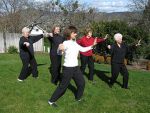Taking Up Exercise As You Grow Older
 Exercise is a vital part of preventative health care as you get older. By taking regular exercise you can prevent weight gain and keep all your organs and body systems healthy. You will also help to prevent cardiovascular disease, osteoporosis, arthritis and many other health problems.
Exercise is a vital part of preventative health care as you get older. By taking regular exercise you can prevent weight gain and keep all your organs and body systems healthy. You will also help to prevent cardiovascular disease, osteoporosis, arthritis and many other health problems.
The Effects Of Exercise:
The heart is a muscle and needs to be exercised just like any other muscle in order to stay strong and healthy. Working the heart during exercise also maintains the health of the arterieis and ensures that blood circulates to all the body’s organs, keeping them supplied with oxygen and nutrients. Exercising has a beneficial effect on every part of the body. It keeps the skin and hair in good condition, it makes you more energetic, it speeds up the passage of food through the digestive system, it speeds up metabolism (the rate at which the body burns calories), it strengthens bones and muscles, it stabilses blood sugar, it prevents weight gain and, if you are carrying surplus fat, it helps you shed it. In other words, exercise prevents many of the physical changes that come with age. Exercise also has a positive effect on the mind and emotions. It is an excellent way of alleviating stress, beating depression and raising your self-esteem.
How Fit Are You:
Your resting heart rate provides a rough guide to your overall level of fitness. Generally, the lower your heart rate, the fitter you are. If you know that you are very unfit, you have not exercised for many years, you are overweight or you have health problems, you should consult your doctor before taking up exercise. To measure your heart rate, press your first two fingers lightly on the pulse point in your neck and count the number of beats over a 15 second period, then multiply that number by 4 to calculate the number of beats per minute.
How Hard Should You Exercise:
 While you are exercising, your optimum heart rate should always be between 60 and 80 per cent of the maximum heart rate (MHR) for your age. In order to calculate your MHR, you simply subtract your age from 220.
While you are exercising, your optimum heart rate should always be between 60 and 80 per cent of the maximum heart rate (MHR) for your age. In order to calculate your MHR, you simply subtract your age from 220.
220 – age = MHR
Next you should calculate 60 per cent of MHR. This is the minimum elevation of your heart rate that you should aim for during exercise. Then calculate 80 per cent of your MHR. This is maximum elevation of your heart rate that you should aim for during exercise. A heart rate that is between 60 per cent and 80 per cent of your MHR is said to be in your training zone. If you are 50 years old, your MHR is 170, your minimum training heart rate is 102 and your maximum training heart rate 136. If you stick to these guidelines, you will be able to burn body fat and exercise your cardiovascular system safely. When you have finished exercising, you should check that your heart returns to its normal rate within 10 minutes. If it takes longer than 10 minutes, it is advisable that you exercise at a slower pace until you become fitter. Another quick test to ascertain whether you are exerting yourself too hard is known as the “talking test”. Make sure that you can always hold a conversation while you are exercising. If you find that you are too out of breath or fatigued to talk, then you are probably exercising too hard.